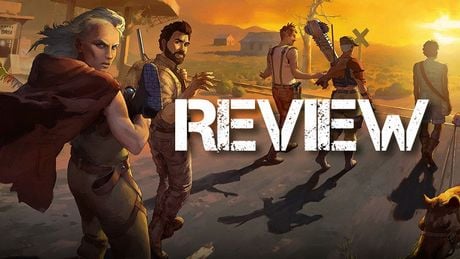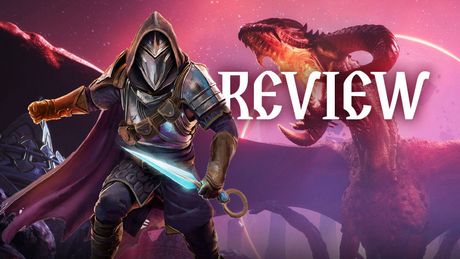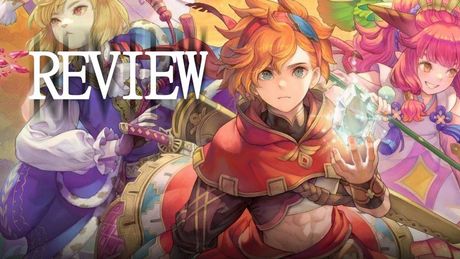Broken Roads - Trite Post-apocalypse for the Very Patient and Understanding
Broken Roads is an unfinished game that can be downright exhausting, entangling us in a plot without a reasonable cause-and-effect sequence and forcing us to play an errand boy. Only the most patient players can find their way in this post-apo.
Broken Roads was supposed to be a game for fans of the old Fallouts. Indeed, the creators give us some freedom of action and do not lead us by the hand, but such a convention has not only been around for a good while, but it has also been misunderstood here. In addition, the lack of polish in terms of technical and narrative aspects of the game gives the impression of dealing with a title that's still in its alpha version.
- very nice, atmospheric locations;
- smoothly written dialogues, philosophical but also with humor;
- freedom in decisions.
- Non-engaging and lacking a cause-and-effect storyline;
- lack of outstanding, charismatic characters;
- a lot of aimless running around, searching and clicking on everything possible;
- terrible combat;
- not very helpful map, unintuitive interface;
- completely redundant character development;
- how should I enjoy freedom of decisions when the story doesn't make sense?
To put it bluntly – Broken Roads exhausted me greatly and I wouldn't want to spend a single minute longer in its world. Despite everything, some players may appreciate the game from Drop Bear Bytes studio, but only if they have angelic patience!
Lost in the wild
I think there were a few different ideas in Broken Roads that turned into a really indigestible mish-mash. The beginning promises a more realistic and down-to-earth approach. The selection of character classes alone, including a barterer or a surveyor, puts the story in a slightly different category than "saving the world" or "making an epic mess." A nice change, I would gladly delve into the fate of a commoner living in the Australian, post-apocalyptic wastelands, skilled in trade and gifted with the art of negotiation, allowing him to find his way among the local bosses, as well as to sell scrap to a dealer at some local market.

However, this concept quickly becomes obsolete, giving way to the tread of leading a number of characters seeking a new home. And I don't even entirely know why the protagonist was suddenly proclaimed a leader, why they suddenly have to save someone, or why someone sees potential in them and wants to use it for their own purposes. There was some reshuffling, but we couldn't examine it closely – at least not because of some temporal leap in action. This is one of the first situations in which the cause and effect sequence is disturbed. The plot doesn't really reveal anything much. In the worst case, we supposedly know the person we're talking to, we even arranged something with them, but in reality, we're meeting them for the first time in our life.
I'm not sure if it's a problem with the scripts, or if a serious mess has crept into the screenplay. I would bet on the latter, because the number of strange, hard-to-explain incidents is only increasing as we progress. Moreover, the characters sometimes behave in a truly senseless way. Someone keeps me alive to attack just a few minutes later, and just before death, convinces me to their cause, to which I had already declared my commitment (interestingly, I can later change sides twice in a short period of time). Mix-up and tangled
My hero – a man of trivialities
After taking over the leadership, we will have to decide who will take power in various towns located in the wilderness. Almost everywhere there is someone waiting for an opportunity to introduce their ideas and we can decide which side we want to support. This pattern continues all the way to the end, which becomes trite. Maybe if similar threads looked interesting in detail, I would have a different opinion about them – but in fact we consider them to be an errands boy, doing the simplest work.
For example – I find it hard to get excited about a task like fixing a sprinkler, but this very favor might persuade someone to the side of the conflict that I decided to aid. Let's add that specific items are needed for the mentioned repair, so I'm facing lots of backtracking to find or buy them. I don't even know who sells them or what exactly these things are!

There are more similar quests. Broken Roads requires the player to click on everything they can, check every dialogue option and, preferably, buy various junk – because you never know when you will need something, and shortages mean going to another location and watching several loading screens along the way. You're unsure if you're in the right location, if you're missing something, or if you need to interact with another character... This results in aimlessly wandering around the world for trivial items, unnecessarily extending the game time and leading to frustration.
I will again point out that none of this makes any sense. Sometimes we need to help someone gather support – just a few conversations to deliver a warning and call one guy home, and the character we're interested in already has the favor of influential people. This just doesn't add up. Sometimes our small actions have disproportionately large effects, while at other times, bigger events we've caused aren't properly acknowledged.
I see chaos everywhere...
Fantasy motifs have also been added to Broken Roads, which unfortunately raise the stakes of events and direct the player into some epic areas. In my opinion, this harms the game and I would prefer it stuck to the realism from the very beginning. Sometimes it's better not to introduce new characters, but focus on developing existing ones. Otherwise, the plot becomes chaotic and leaves us unsatisfied, feeling that not every storyline was properly explored. Moreover, we often lose sight of the goal of history – as if it were on the sidelines or did not even exist at all.
A colleague from the editorial office, also playing Broken Roads, even asked me two or three times if I saw any semblance plot leading to something here. In fact, I didn't – motivations, missions, goals are blurred, as if they were the least important parts of the whole. In its entirety, which might sometimes have taken on more distinct features if we eagerly grasped every secret, but personally I lacked the commitment to such actions. What I was discovering did not give me enough satisfaction to want to spend more hours running around in the hope of finding a new micro-mystery.
Unfortunately, the gameplay is not encouraging exploring the world and all its secrets . Too much pointless searching, watching loading screens, tedious chatting with characters in various locations to advance the plot... There are also technical glitches, and I'm not sure if they'll be fixed in time. For example, My character had to trek across the map to chat with a certain NPC who wasn't even there – but no worries, the dialogue still triggered. Such a distant conversation, I wonder if they had to shout at each other?
Problems at every step
There are plenty of shortcomings. The map lacks clever markings telling us who's a trader and who's just a regular NPC to talk to. Meanwhile, on the world map, one click of the mouse and our team is already on the move, even though we only wanted to see the terrain further, not necessarily head towards it. During the journey, we may be attacked – choosing the "escape" option always ends with avoiding the fight without any losses. Character development turns out to be "so important" that I forgot I was leveling up and had to distribute statistics points. You can also easily get by without managing your equipment, for me buying a new weapon once in the entire game was enough.

You can actually avoid conflicts quite effectively, and I don't think there are too many of them to begin with. And they can glitch, for example, suddenly in the middle of a confrontation, when my next character died, someone shouted victory – even though the opponents were still on the battlefield and remained there, but they were no longer aggressive. As if that wasn't enough, the fights are very tedious because when the enemy's silhouette overlaps another object, you can't properly direct the attack. There's also an issue when opponents are too close to each other – it makes it hard to aim properly. It would be possible to get around this if the camera allowed for a 360-degree rotation – without this feature, we are, excuse my language, screwed.
VERDICT:
Ultimately, we can talk about a flop. I'm playing an underdeveloped and thoughtless game, requiring boring, time-consuming tasks. Messy, both in terms of the script and gameplay, which multiplies problems.
Find all our reviews on Metacritic and Opencritic.
It's tragic, but there are some positives to be found
I understand the ambitions of the creators. I see the features of old Fallouts at work, but the challenge for the player cannot derive from looking for the answer to some absurd question throughout the game world! Needless to say, searching happens in a way that makes us question every NPC we encounter, or check if we can discuss our topic of interest with them. I also see something from Fallout: New Vegas here, i.e. a short main plot with a lot of side content. But in the Obsidian game, I felt more engagement, the characters were more authentic, and the story was coherent.
Despite everything, I appreciate Broken Roads for its beautiful locations. The style mixing realistic post-apocalypse with fantasy has its own charm. I also admire quite skillfully written dialogues – sure, I read them without much interest, but also without pain, and there is quite a lot of philosophical pondering here. Additionally, some raw vulgarity was added, giving the game moments of distinct character. There is a certain freedom in choices, although without properly realized consequences, freedom is pushed into the background, and the finale turns out to be too hasty. The world has been well developed – various views and attitudes clash in it, solutions designed to ensure survival, various cultures. This could have been the setting for an interesting story. Keyword: "could."

Ultimately, we can talk about a flop. I'm playing an underdeveloped and thoughtless game, requiring boring, time-consuming tasks. Messy, both in terms of the script and gameplay. This poses further problems – because moving the plot requires wandering around the locations aimlessly, and we cannot direct the attack at the right enemy when in combat. However, if someone has a lot of patience and understanding and would like to spend many hours looking for secrets and delving into philosophical topics, they can give Broken Roads a chance. Nevertheless, I warn you, even after forgiving shortcomings, I would not see potential for anything good here.




